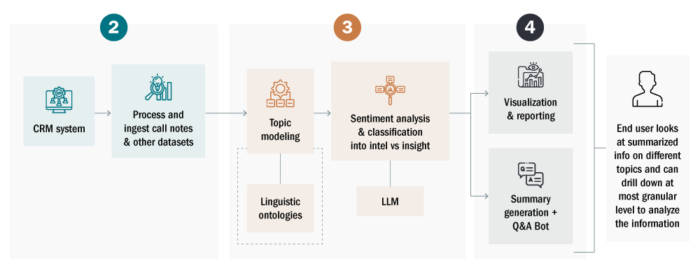This post is part of a series describing how to implement AI solutions to extract value from med affairs notes. Through our collaborative projects with clients, we apply a systematic approach to design fit-for-purpose solutions that meet our clients’ needs. In this series, we introduce the common challenges we see life science companies encountering and how these can be successfully overcome.
The unstructured nature of notes creates challenges in extracting insights
Gathering the intelligence required for med affairs functions relies on frequently engaging with healthcare professionals (HCPs). During these interactions, vast amounts of information and real-world insights are exchanged and captured in notes that can be used for the following purposes:
Purpose | Type of information collected | How the information is used |
|---|---|---|
Therapeutic landscape intelligence | Real-world feedback on drug efficacy, side effects, overall perception, and uptake | Inform marketing strategies and messaging |
Therapeutic landscape trends | Emerging trends and shifts in the therapeutic landscape | Proactively adjust marketing and communication strategies |
Competitive analysis | Insights into how competitors’ products are perceived and used | Refine positioning and differentiation strategies |
Identifying unmet needs | Gaps in current treatments from the HCP and patient perspectives | Guide research and development toward areas with high needs |
Training | Common questions and concerns raised by HCPs and patients | Inform training programs for sales reps as well as training and education for HCPs and patients regarding disease and treatment characteristics |
Patient experience | HCP input on patient experiences and outcomes | Develop more patient-centric products and support programs |
However, the unstructured nature of the majority of notes creates challenges for easily and quickly categorizing and using the insights, especially when it is a manual, human-driven process. Because of this, med affairs teams use as little as <1% of their notes in a systematic way, meaning they miss out on the rich information gathered from real-world users of their companies’ products.
Technological tools, such as text mining using natural language processing (NLP) and GenAI, can change the paradigm of med affairs notes processing, allowing companies to:
- Automate the generation of actionable insights from these notes
- Create opportunities for more personalized customer engagement
- Free their teams’ time from administrative tasks
- Enable greater focus on creating deeper, high-value interactions with internal and external stakeholders
https://setda.purbalinggakab.go.id/berita/strategi-bermain-mahjong-yang-membalikkan-angka-kalah-jadi-menang.html
https://setda.purbalinggakab.go.id/berita/strategi-bertaruh-terbukti-untuk-maksimalkan-win-rate-mahjong.html
https://setda.purbalinggakab.go.id/berita/strategi-pemenang-yang-tidak-pernah-anda-sadari.html
https://setda.purbalinggakab.go.id/berita/strategi-tersembunyi-pro-player-dalam-mengalahkan-rtp-gacor.html
https://setda.purbalinggakab.go.id/berita/teknik-kombinasi-tangan-yang-mengalahkan-ai.html
https://setda.purbalinggakab.go.id/berita/temuan-terkini-rtp-mahjong-ways-yang-bisa-meningkatkan-kemenangan.html
https://setda.purbalinggakab.go.id/berita/trik-bermain-mahjong-wins-yang-belum-banyak-dibahas-di-internet.html
https://setda.purbalinggakab.go.id/berita/3-metric-yang-harus-diperhatikan-pemain-mahjong-ways-untuk-baca-risiko-nyata.html
https://setda.purbalinggakab.go.id/berita/3-pola-menang-mahjong-menjadi-game-changer.html
https://setda.purbalinggakab.go.id/berita/5-kesalahan-umum-yang-justru-mengurangi-rtp-anda.html
https://setda.purbalinggakab.go.id/berita/7-pola-tersembunyi-yang-menentukan-kemenangan-anda.html
https://setda.purbalinggakab.go.id/berita/algoritma-tersembunyi-di-balik-pola-game-yang-paling-sering-menang.html
https://setda.purbalinggakab.go.id/berita/analisis-pola-mesin-pg-soft-yang-mengubah-cara-main-anda-selamanya.html
https://setda.purbalinggakab.go.id/berita/antara-strategi-dan-realitas-sistem.html
https://setda.purbalinggakab.go.id/berita/apa-artinya-untuk-strategi-anda.html
https://setda.purbalinggakab.go.id/berita/bagaimana-animasi-mengubah-cara-kita-membaca-rtp.html
https://setda.purbalinggakab.go.id/berita/bagaimana-peta-simbol-memengaruhi-frekuensi-scatter-dan-bonus.html
https://setda.purbalinggakab.go.id/berita/bagaimana-rtp-mahjong-wins-dipahami-diluar-angka.html
https://setda.purbalinggakab.go.id/berita/bagaimana-ui-mahjong-ways-mengarahkan-keputusan-pemain-tanpa-mengubah-angka.html
https://setda.purbalinggakab.go.id/berita/bagaimana-volatilitas-mahjong-ways-mengubah-strategi-taruhan-anda.html
https://setda.purbalinggakab.go.id/berita/cara-cerdas-memanfaatkan-rtp-untuk-dominasi-di-mahjong-wins.html
https://setda.purbalinggakab.go.id/berita/catatan-pemain-malang-tentang-variasi-hasil-dan-psikologi-bermain.html
https://setda.purbalinggakab.go.id/berita/insight-baru-tentang-varians-dan-pola-kemenangan-di-slot-mahjong.html
https://setda.purbalinggakab.go.id/berita/kebetulan-statistik-atau-pola-yang-perlu-diwaspadai.html
https://setda.purbalinggakab.go.id/berita/kenapa-pengalaman-pemain-mahjong-ways-sering-berbeda-dari-statistik.html
https://setda.purbalinggakab.go.id/berita/kisah-pemain-bali-membaca-rtp-sebagai-konsep-jangka-panjang.html
https://setda.purbalinggakab.go.id/berita/kisah-pemain-mahjong-wins-dalam-memahami-rtp-secara-rasional.html
https://setda.purbalinggakab.go.id/berita/memaknai-mahjong-wins-melalui-perspektif-statistik.html
https://setda.purbalinggakab.go.id/berita/membaca-lawan-meningkatkan-peluang-kemenangan-anda.html
https://setda.purbalinggakab.go.id/berita/membedah-mitologi-waktu-emas-dengan-pendekatan-statistik.html
https://setda.purbalinggakab.go.id/berita/mengapa-angka-resmi-tak-selalu-menceritakan-pola-pembayaran-mikro.html
https://setda.purbalinggakab.go.id/berita/mengapa-pembaruan-minor-mahjong-ways-bisa-mengubah-pengalaman-tanpa-sentuh-rtp.html
https://setda.purbalinggakab.go.id/berita/mengelola-ekspektasi-di-dunia-probabilitas.html
https://setda.purbalinggakab.go.id/berita/narasi-pemain-mahjong-wins-tentang-proses-bukan-sekadar-hasil.html
https://setda.purbalinggakab.go.id/berita/penemuan-slot-pragmatic-play-yang-paling-sering-meledak-dengan-kemenangan.html
https://setda.purbalinggakab.go.id/berita/perspektif-pemain-jakarta-tentang-rtp-dan-pengambilan-keputusan.html
https://setda.purbalinggakab.go.id/berita/pola-tak-terduga-yang-sering-dilupakan-pemain-dimahjong-ways.html
https://setda.purbalinggakab.go.id/berita/rahasia-pola-mahjong-wins-yang-belum-diungkap-para-pemain-pro.html
https://setda.purbalinggakab.go.id/berita/refleksi-seorang-pemain-dari-surabaya-tentang-probabilitas-dan-kesabaran.html
https://setda.purbalinggakab.go.id/berita/strategi-adaptif-yang-meningkatkan-rtp-hingga-98.html
https://bedagas.desa.id/
https://axis.idealake.com/
https://entropyfi.com/
https://docs.entropyfi.com/
GenAI-generated insights improve HCP engagement by 30%
AI-driven processes are highly suited to tackling the mundane, time-consuming, and error-prone tasks of manually reviewing and synthesizing large amounts of information. Recognizing this potential, ~70% of life sciences companies have explored the use of GenAI to generate insights for their commercial operations, including med affairs, with some companies benefitting from a >30% improvement in HCP engagement quality based on the GenAI-generated insights and personalized content. This demonstrates that med affairs field notes offer high-impact rewards and could be a useful use case to establish the foundation from which companies can grow their AI capabilities.
The value of NLP for med affairs notes stems from its ability to transform the unstructured text that reps write—often with different terminology, abbreviations, and shorthand—into structured data that can be easily categorized and described. The structured data can then be used to uncover patterns and trends across various HCP interactions, develop strategies for asset development, enhance HCP education and training, and improve the patient experience.
NLP capabilities:
- Quickly, efficiently transform raw, unstructured call notes into structured, categorized data
- Automatically account for errors in grammar, style, and referencing
- Determine the sentiment of the information: positive, negative, neutral
GenAI further acts on the data to:
- Generate summaries and visualizations of the key topics from the notes and newly emerging topics or signals of importance
- Enable the ability to ask questions and receive summarized responses about the data, essentially a Q&A chatbot
27% of organizations have banned GenAI applications
With the rapid advancement in AI technology, life science companies that delay its introduction risk being outpaced by competitors and overcoming greater challenges in adoption and acceptance by their teams later. Despite this disadvantage, many companies limit their use of AI because they run into obstacles. Some of the common challenges we’ve heard from our clients include the following:
Inadequate off-the-shelf products | “Black box” AI implementation | Privacy concerns with public tools | Resource-intensive in-house development |
|---|---|---|---|
Off-the-shelf products are typically not designed for the highly specific, highly technical data sets that exist in healthcare. | The “black box” implementation of most off-the-shelf products makes it challenging to ensure the accuracy of AI-derived outputs and recommendations in a field that is influencing patient outcomes. | The use of public tools such as ChatGPT raises concerns around the privacy and confidentiality of sensitive information. | In-house development of an AI solution requires considerable resources in terms of time, staff, and computing power as well as long development times. |
This is why, according to the Cisco 2024 Data Privacy Benchmark Study, 27% of organizations have banned the use of GenAI applications, and 65% of top 20 pharma prohibit the use of ChatGPT because of hallucinations, data security concerns, and lack of staff training on appropriate use.
4 key considerations to design AI solutions for med affairs notes
Despite the challenges and skepticism surrounding GenAI for med affairs applications, its use can transform med affair note processing when implemented appropriately. Companies that have already introduced AI for a single use case, such as med affairs notes, within their organization and grown the technology from there benefit from:
- Early learnings on smaller use cases that can facilitate scaling across the organization
- Tailored solutions that grow with their needs
- Incremental enhancements, rather than large infrastructural changes as the technology matures
Based on our experience working with multiple clients over many years, our team identified 4 key steps to successfully design fit-for-purpose AI solutions for med affairs notes. Steps 2, 3, and 4 are shown in the diagram below.
- Obtain organizational buy-in
- Optimize your data foundation
- Process the data to generate accurate, relevant insights
- Visualize and report the insights for all stakeholders

In the next blog posts in this series, we dive deeper into what each of these steps involves, the common roadblocks encountered, and strategies to move past those roadblocks, starting with strategies that we’ve found successfully increase organizational pull-through.

